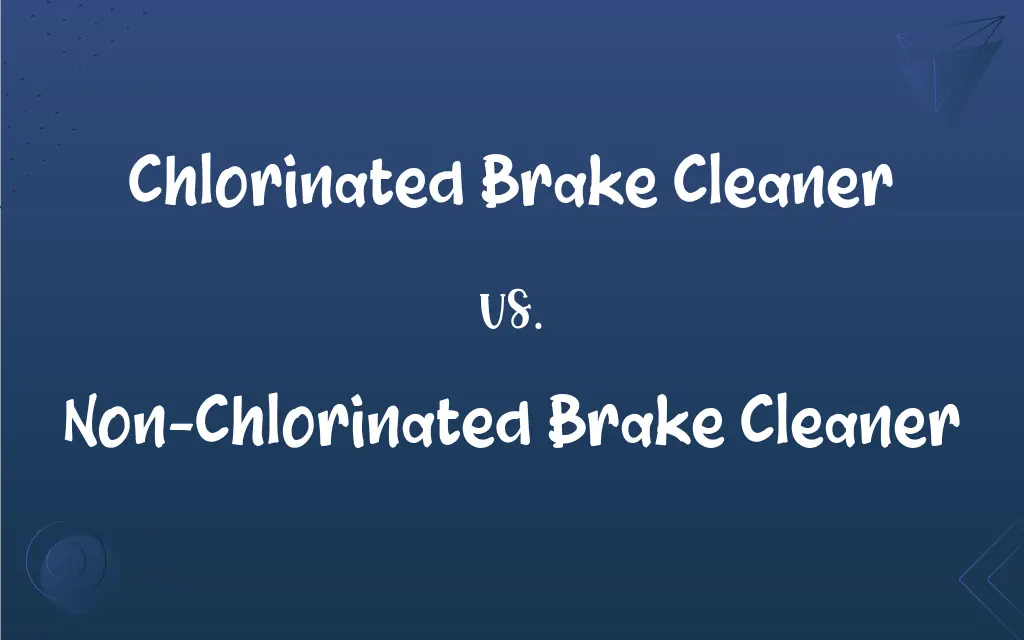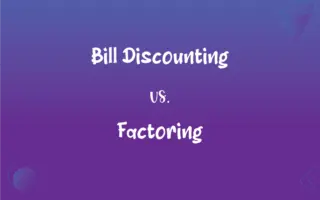Chlorinated Brake Cleaner vs. Non-Chlorinated Brake Cleaner: What's the Difference?
Edited by Harlon Moss || By Janet White || Published on April 4, 2024
Chlorinated brake cleaner contains chlorine-based solvents, while non-chlorinated brake cleaner uses hydrocarbon-based solvents, offering different safety and environmental impacts.

Key Differences
Chlorinated brake cleaner and non-chlorinated brake cleaner are two types of solvents used for cleaning brake parts and other mechanical components. The primary difference lies in their chemical composition. Chlorinated brake cleaners contain chlorine-based solvents such as tetrachloroethylene, which are highly effective in dissolving grease, oil, and dirt. Non-chlorinated brake cleaners, on the other hand, are formulated with hydrocarbon-based solvents like heptane or acetone. These alternatives are considered safer for the user and the environment, as they do not produce as harmful fumes as chlorinated solvents.
One of the significant advantages of chlorinated brake cleaners is their non-flammability. The presence of chlorine in these cleaners reduces the risk of fire, making them safer to use in environments where sparks or open flames might be present. Conversely, non-chlorinated brake cleaners are flammable due to their hydrocarbon content, necessitating greater caution during use.
The choice between chlorinated and non-chlorinated brake cleaners depends on several factors, including the specific cleaning needs, safety requirements, environmental considerations, and regulatory compliance. Each type has its advantages and limitations, making it important to select the right cleaner for the job.
Comparison Chart
Solvent Base
Chlorine-based solvents.
Hydrocarbon-based solvents.
Evaporation Rate
Fast, leaves no residue.
Slower, may leave a residue.
ADVERTISEMENT
Flammability
Generally non-flammable.
Flammable.
Environmental Impact
Higher toxicity, more hazardous waste.
Lower toxicity, more environmentally friendly.
Effectiveness
Highly effective on grease and oil.
May require more effort or product on tough grime.
Chlorinated Brake Cleaner and Non-Chlorinated Brake Cleaner Definitions
Chlorinated Brake Cleaner
More environmentally and health hazardous.
She wore gloves and a mask to use the chlorinated brake cleaner safely.
Non-Chlorinated Brake Cleaner
Safer for the user and the environment.
Non-chlorinated brake cleaner was chosen for its minimal environmental impact.
ADVERTISEMENT
Chlorinated Brake Cleaner
Leaves surfaces dry and residue-free.
After application, the chlorinated brake cleaner left the surface completely clean.
Non-Chlorinated Brake Cleaner
May evaporate more slowly compared to chlorinated cleaners.
The non-chlorinated brake cleaner took longer to dry but cleaned well.
Chlorinated Brake Cleaner
Known for its strong cleaning power.
Chlorinated brake cleaner dissolved the oil spill effortlessly.
Non-Chlorinated Brake Cleaner
Flammable, requiring careful handling.
He ensured there were no sparks when using the flammable non-chlorinated brake cleaner.
Chlorinated Brake Cleaner
Often chosen for its non-flammable properties.
Due to fire risks, they exclusively used chlorinated brake cleaner in the shop.
Non-Chlorinated Brake Cleaner
Effective with a slight increase in effort.
Using non-chlorinated brake cleaner required more scrubbing, but it was effective.
Chlorinated Brake Cleaner
A solvent that uses chlorine-based compounds for cleaning.
He used chlorinated brake cleaner to quickly degrease the brake caliper.
Non-Chlorinated Brake Cleaner
Utilizes hydrocarbon solvents for cleaning purposes.
He preferred non-chlorinated brake cleaner for its safer ingredients.
FAQs
Why choose chlorinated brake cleaner?
For its strong degreasing capability and non-flammability.
Is chlorinated brake cleaner flammable?
It is generally non-flammable.
Is non-chlorinated brake cleaner safer to use?
Yes, it's considered safer due to its lower health risks.
Does non-chlorinated brake cleaner leave residue?
It can leave a residue if not fully evaporated.
What are the environmental concerns with chlorinated brake cleaner?
Its disposal and toxic by-products can harm the environment.
Why might someone prefer non-chlorinated brake cleaner?
Due to its lower toxicity and environmental impact.
Can chlorinated brake cleaner be used on all parts?
Yes, but with caution on plastic and rubber components.
What is chlorinated brake cleaner?
A cleaning solvent containing chlorine-based chemicals.
Can non-chlorinated brake cleaner catch fire?
Yes, it's flammable and should be used away from open flames.
What is non-chlorinated brake cleaner?
A cleaner formulated with hydrocarbon solvents.
Can I use chlorinated brake cleaner indoors?
Yes, but ensure good ventilation due to toxic fumes.
Is non-chlorinated brake cleaner biodegradable?
Some formulations are more environmentally friendly.
How do I dispose of used chlorinated brake cleaner?
Follow local hazardous waste disposal guidelines.
What precautions should be taken when using non-chlorinated brake cleaner?
Avoid ignition sources due to flammability, and use in a well-ventilated area.
How fast does chlorinated brake cleaner evaporate?
Very quickly, leaving surfaces dry and clean.
Are there restrictions on using chlorinated brake cleaner?
Yes, some regions have restrictions due to environmental concerns.
Can I switch between using chlorinated and non-chlorinated brake cleaners?
Yes, but consider the specific needs and safety requirements of each job.
How effective is non-chlorinated brake cleaner on heavy grease?
Effective, though may require more product or effort.
What should I wear when using chlorinated brake cleaner?
Protective gloves and eyewear, and possibly a respirator.
Can non-chlorinated brake cleaner be used on electrical components?
Yes, but check compatibility and flammability concerns.
About Author
Written by
Janet WhiteJanet White has been an esteemed writer and blogger for Difference Wiki. Holding a Master's degree in Science and Medical Journalism from the prestigious Boston University, she has consistently demonstrated her expertise and passion for her field. When she's not immersed in her work, Janet relishes her time exercising, delving into a good book, and cherishing moments with friends and family.
Edited by
Harlon MossHarlon is a seasoned quality moderator and accomplished content writer for Difference Wiki. An alumnus of the prestigious University of California, he earned his degree in Computer Science. Leveraging his academic background, Harlon brings a meticulous and informed perspective to his work, ensuring content accuracy and excellence.
































































